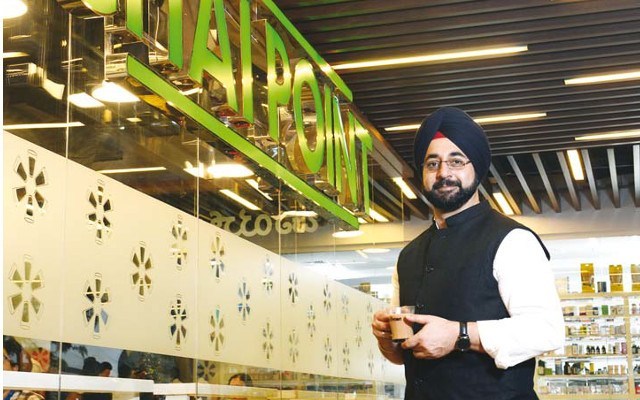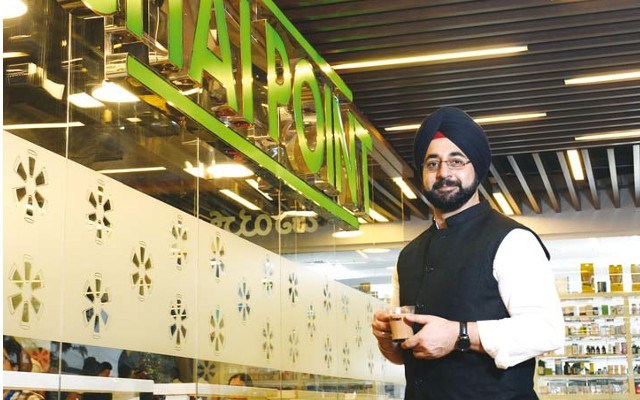Amuleek Singh, Co-founder and CEO, Chai Point, speaks to FoodService India about millennials and corporates being the target customer base for the brand, its technological initiatives like Shark and BoxC taken for the ease of customers, and the brand’s environment-friendly approach through introduction of sustainable concepts like BYOC to associate more actively with the younger generations.

How do you look at the prospects, outlook and opportunities for growth of Chai Point in particular and your cafe foodservice format in general?
Chai is a ritual for Indians. We want to be a part of that ritual as a café in foodservice space. With over 100+ stores across the country and many more coming up in 2019, the opportunity for growth is immense for the brand. The important thing to keep in mind is that the end game is profitability. The rapid expansion of the F&B sector in India is creating a lot of opportunities for newer brands like us. Brands, which are authentic and Omnichannel, will stand out in the market.
What is your value-for-money proposition for guests and which are your key customer demographics?
Chai totals 75 percent of non-alcoholic beverages. As a brand, we power the core concept of Chai Point – as being a creative, exciting hub for serving the traditional beverage of India. We want to manage this by being present at every touch point for the convenience of consumers and serving them the chai that is best in quality and consistency.
The corporates and the millennials are the target customer base for the brand. This segment of customers want to associate with the brands that practice their core values. Our target customers are environmentally conscious and focus on quality and freshness. They are also particular about convenience and accessibility. It is in our brand’s DNA to be Omnichannel and our team continuously strives to live up to these core values.
Over the past six years, we have switched to sustainable alternate options like using bagasse-based cutlery, selling beverages in glass bottles instead of plastic, reducing waste and aligning with supply chains to achieve sustainability. Recently, we also rolled out a new initiative BYOC — Bring Your Own Cup and it received a thundering response from our customers. Now, we are in the process of implementing it across all the stores. Essentially, we are asking our customers to bring their cup to enjoy their favorite chai and help us reduce the usage of paper cups.
What is the catchment you are looking for and what is your location strategy?
Chai Point stores are located in business districts, tech parks with a corporate crowd concentration and on high-streets.
Which are your best-selling products and specialties?
Ginger chai and banana cake are bestsellers in the beverage and food categories, respectively. In addition, we recently introduced a range of delicious paranthas that have become a craze amongst the consumers during the winter season.
What is your marketing and sales strategy and which are the tools you are using to promote the brands?
We have never felt the need to do aggressive ATL spends as stores are our core brand platform. All the brand’s spends are BTL-centric. Chai Point wants to continue with this strategy in the future as well.
Apart from this, we are digitally aware and want to promote the brand online as our audience is digital savvy. The area where our spends can be categorized as ATL and are likely to get more sophisticated and aggressive over time would be around drawing out the big MNCs.
Which are your strongest markets at present and what has been your growth like over the past year?
We embarked on building an Omnichannel brand, one that is present and accessible whenever the customer wants it and where he wants it. Today, Chai Point is present through its 115 plus store network in 8 cities, chai on call — which is our delivery model through our app, a partnership with the biggest food tech partners, selling our brand of loose leaf tea through the leading e-commerce sites and servicing the corporate channel through IoT enabled dispenser boxC.in.
The fastest growing regions for Chai Point are Delhi-NCR, Bangalore, and Hyderabad. Our strongest markets are in Bangalore and in Delhi NCR.
How do you plan to make your retail space, service and offerings more exciting in 2019?
The whole idea is to create a better experience for customers. Taking that into consideration, we are going to add more products to our range of F&B and have lined up some great stores that will be opened across the regions.
What is your assessment of the current state of the cafe sector in India and what have been its major evolutionary leaps over the years?
The F&B sector in India is registering faster growth in terms of consumption, business expansion, and investors interest. According to a report by NRAI, the F&B segment annual sales could touch close to US$300 billion – clearly indicating the strong consumption trend in the Indian market.
Please describe how and in what forms you are deploying technology to make your business more efficient and customer friendly?
Leveraging next-generation technology to continuously improve the customer experience, at all our touch points is integral to Chai Point’s core strategy. The in-house tech team at Chai Point has, over the years, built innovations that have been integrated into our operations seamlessly, making Chai Point one of the fastest growing brands in the F&B segment.
Some of our tech initiatives include:
a) Face recognition for billing in stores
b) IoT enabled boxC.in
c) Shark: The operating platform, which runs Chai Point’s operations across formats connecting them directly to supply chain, logistics, warehouse, finance and business operations.
How are you bringing technology to bear on your logistics, supply chain and innovation?
We have an in-house team of tech persons who have built Shark. The team is running and managing it. Shark runs every aspect of Chai Point. Right from sourcing to supply chain to stores, billing, warehousing, etc, Shark connects stores with the back-end operations.
Since corporate professionals are our target customers, it is important that we are most accessible to this customer base. By design, our stores are present inside top corporate parks and inside leading corporates. We launched IoT enabled dispenser boxC.in, to scale up fast in the corporate segment. The dispenser is in its latest avatar as an Android platform machine and linked to the Chai Point command center. The client has a dashboard to check cup wise consumption while the machine sends info to the command center. In case there is a problem with the machine, it flags off a warning to the command center where the troubleshooting can be done. We have also incorporated a payment option in boxC.in, where customers can use their Paytm wallet to pay for the beverage.
Earlier this year, we rolled out face recognition billing for our loyal customers. The idea was inspired by our customer feedback, guests who visits our stores 4-5 times a day and didn’t like the experience of giving the staff their mobile number every time for the loyalty points. With the introduction of face recognition, it has become easier for the customers as their personal details are already encrypted in the cloud. There is a level of privacy in this system as only the last four digits of the mobile number are visible to the employees. We also have plans to scale up the use and benefits of face recognition technology.
Please describe your brand’s key achievements so far and what do you attribute them to?
We believe our achievements lie in the acceptance that we have received from the customers, over the years. Our initiatives, whether in regards to environmental protection, the launch of new products, and rolling out new services or loyalty programs, have got a strong feedback from our customers. However, for us,the biggest achievement is that we are constantly interacting with our customers, listening to their feedback and launching new initiatives based on customer feedback.
What are your short-term and long-term goals?
There is an immense opportunity in the tea business. Iced tea, which is a huge market abroad, has not been recognized in India. The brand is planning to open 20 more outlets in the next three to four months. As of now, all the outlets are company-owned and company-operated. In the future, Chai Point will continue with the same operating model.
The brand is still at a relatively nascent stage and we believe that we need to have our own stores to cement the system. It is more important to redefine and improve the customer experience at our stores. Home delivery and boxC are faster growing segments for the brand and support the store format. At present, stores and delivery from stores contribute 56 percent to the total revenue; 4 percent comes from the packaged food business and the remaining 40 percent from boxC business.
The past six years have been profitable for the brand. We are aiming to be EBITDA level 100 percent profitable by this fiscal-end, covering all the expenses that we have taken towards our Omnichannel growth. On a run rate basis, the brand is targeting to gross Rs 200 crore by the end of the fiscal year.

